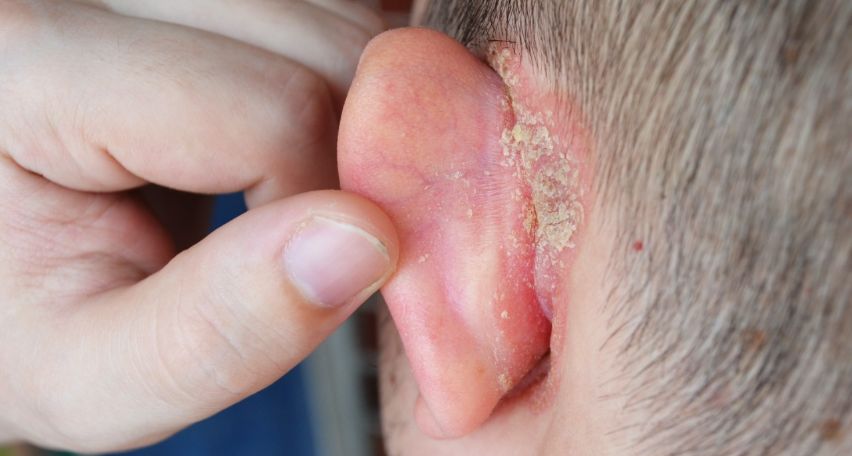Ears are more vulnerable to vagaries of weather and are affected easily too. The skin of the ear and the area behind the ear, when exposed to cold or windy weather, low humidity indoors, over-washing, and air-conditioning, can turn dry, scaly, or itchy. This is called eczema or atopic dermatitis and is not a very serious condition. Though the itchiness and dry skin are irritating, the condition can be treated effectively.
There are several types of Eczema that may affect any part of the body. Wherever they appear, the general symptoms they exhibit are extremely red, dry, and scaly skin. It is also itchy and this can become embarrassing over a period of time.
If it affects your inner ear, the area around the ears, and the crease where the ear meets the head, the symptom is dry flaky skin inside the ear canal. Redness and swelling may be present inside and around the ear.
Symptoms
But, over a period of time, constant itching due to dryness can cause the skin to crack and this condition will increase your risk of developing infected eczema. This will increase the wax and affect hearing. More severe symptoms include ear pain, yellow or green discharge from the ears, redness, and fever.
The symptoms turn worse during dry weather or winter. Ears are affected by different kinds of eczema – allergic eczema, asteatotic eczema & seborrheic dermatitis. Irritants or substances that you are allergic to cause allergic eczema.
Kinds of Eczema
If the symptoms appear in your ears then the irritants may be new hair products, earrings, headphones, or even the products that were used by you at the beauty parlor. At times this kind of allergy might flare up due to idiopathic reasons.
The elderly are affected by asteatotic eczema. It happens when their skin is exposed to the vagaries of weather. Other factors that might make it worse include indoor heating or overwashing.
The third kind of eczema affects the oily areas of the body. It might include the skin behind your ears, scalp, and inner ear. Doctors are of the view that it could be related to a fungus in the oil secreted by the glands in your skin or even an immune response.
Diagnosis & Treatment
A simple basic examination is enough to diagnose the eczema of the ears. If needed, the doctor might go in for a biopsy to rule out similar conditions.
Just like the cause, treatment too depends on the type of eczema and the underlying cause. If you are suffering from allergic eczema, you need to get away from the allergens or irritants. If it is seborrheic eczema, antifungal application to the affected is the remedy. If the skin behind the ear is infected or if there is inflammation, topical steroids are used. If the ear canal is affected, steroid ear drops work well.
Regardless of the type of eczema you have, it is always best to keep the area moisturized to avoid dryness and flakiness. Harsh soaps and cleansers also should be avoided as they make the condition worse. Try to use products that are skin-friendly and have anti-inflammatory properties.
Eczema is easy to treat but it takes some time for the skin to react to the medications. From home remedies to steroid drops or non-steroidal ones one needs to stick to the treatment consistently for the best results. A word of caution: Never go in for over-the-counter remedies. Consult a good dermatologist to check if you have an ear infection or allergic reaction and then proceed with the treatment with a proper medical practitioner.
